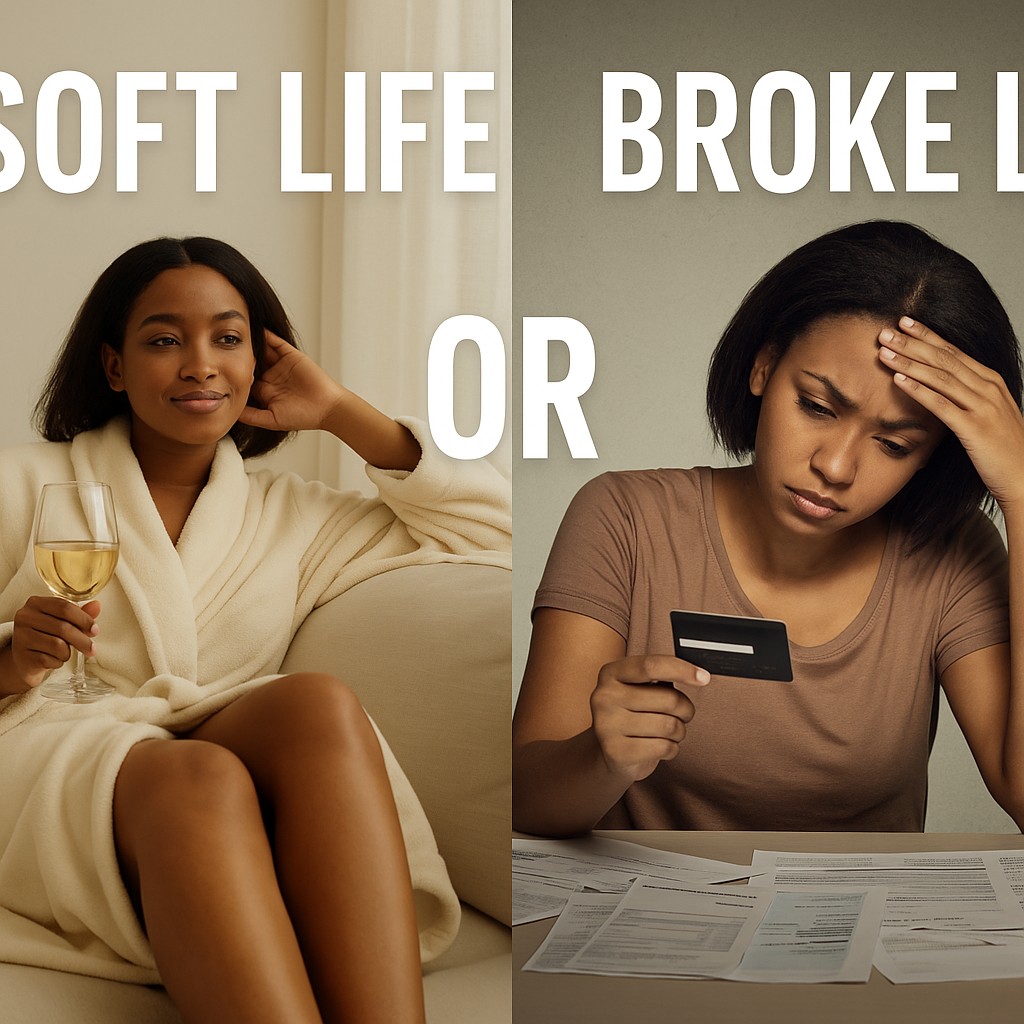
Soft Life or Broke Life? The Dangerous Truth Behind Nigeria’s New Lifestyle Craze
Welcome to the Age of the Soft Life
In Nigeria today, the phrase “I just want to live the soft life” has become a mantra. It’s printed on T-shirts, whispered in Instagram captions, and repeated like scripture across TikTok videos. It represents ease, enjoyment, and freedom from the endless hustle. But here’s the dark truth no one wants to admit:
For many, the soft life isn’t soft it’s suffocating.
Beneath the filters, dinner dates, and designer knockoffs lies a rising wave of debt, anxiety, and performance pressure.
So we ask: is the soft life still self-care?
Or has it quietly become a broke life masquerading as luxury?
1. What Exactly Is the “Soft Life”?
The “soft life” is marketed as a peaceful, stress-free existence. Think:
- Weekend getaways
- Skincare routines
- Fine dining
- Working less but earning more
- Saying no to suffering in the name of hustle
Sounds like a dream, right?
But in Nigeria where inflation is skyrocketing, minimum wage can barely feed a family, and 70% of youths are underemployed chasing this lifestyle often means living beyond your means just to look the part.
2. The Instagram Illusion: Where Reality Goes to Die
Social media has redefined success in Nigeria. Aesthetics now matter more than actual comfort.
It doesn’t matter if you’re in a one-room apartment with no light or AC — as long as your photo shows you sipping wine in a “minimalist” space, you’re living the soft life.
But here’s the harsh reality:
Many people posting the “soft life” online are:
- Borrowing clothes
- Renting hotel rooms for photo shoots
- Maxing out credit cards
- Taking loans to “live soft” for the ‘Gram
It’s no longer about peace it’s about performance.
3. The Financial Toll: Debt in Designer Packaging
Living a lifestyle you can’t afford isn’t new, but the “soft life” trend has normalized it. Nigerians are racking up:
- Buy-now-pay-later debt
- Unsecured loans from shady apps
- Debt from online shopping platforms like Instagram boutiques
- Peer pressure-induced spending
People now view saving money as boring and budgeting as broke behavior. How dare you say no to brunch just because you’re planning for rent?
In this world, soft equals spending even when you’re silently drowning in bills.
4. Gen Z & The Hustle Paradox: Work Less, Spend More?
Gen Z Nigerians are rejecting the grind culture of their elders — and rightfully so. But here’s where it gets twisted:
They want to avoid hustle, yet also want soft life.
They reject 9-to-5 jobs, yet expect luxury vacations.
Some turn to influencing, betting, or “freelance gigs” with no consistent income but a curated lifestyle online.
When the soft life becomes an escape from responsibility, not a reward for discipline, we’re creating a generation chasing pleasure with no plan.
5. Influencers, Skit Makers & Fake Wealth Culture
Let’s address the enablers.
Today’s influencers constantly flaunt:
- Trips to Dubai
- iPhone 15 Pro Max
- Skincare routines with ₦80,000 creams
- “Soft life” giveaways they probably didn’t fund themselves
What they don’t show is:
- Brand debt
- Unpaid rent
- Gifts from sugar daddies or sponsors
- The mental health toll of keeping up appearances
We’ve created a digital class of “aspirational hustlers”, where followers copy lifestyles they can’t verify and can’t afford.
6. The Gender Divide: Is the Soft Life a Feminist Trap?
For many Nigerian women, the soft life movement started as a feminist rebellion against suffering. No more “ride or die.” No more stress. Just peace, money, and enjoyment.
But lately, the narrative is being hijacked:
- Some now associate “soft life” with dating rich men only
- Others pressure women to look expensive 24/7
- And there’s growing pressure to perform femininity as luxury
Now, women feel judged if they’re working too hard as though working hard is masculine and unaesthetic.
What was once empowerment is becoming another box of expectations.
7. The Emotional Cost: Anxiety in a Silk Robe
Behind every “soft life” influencer is often:
- Anxiety about engagement
- Fear of losing clout
- Constant comparison
- Insecurity about not being “soft” enough
What started as a quest for peace is now a breeding ground for pressure.
People feel like failures just because they’re not living in Lagos Island, using imported candles, or having monthly facials. That’s not soft. That’s stress.
ALSO READ
How Do You Describe a Lifestyle?
10 TIPS FOR MAINTAINING A HEALTHY LIFESTYLE AND …
WhatsnextNG Conclusion: Soft Life Isn’t the Problem Pretending Is
Let’s be clear: there’s nothing wrong with wanting rest, luxury, or peace. Nigerians have suffered enough, and everyone deserves ease.
But the real soft life is:
- Financial freedom
- Emotional stability
- Living within your means
- Saying no to pressure
- Not needing to prove anything to anyone
If you have to borrow, beg, or lie to keep up the lifestyle, that’s not soft that’s a broke life in disguise.
This article dives into the growing “soft life” trend among Nigerian youths a lifestyle movement that promotes ease, luxury, and escape from hustle culture. While the idea seems peaceful on the surface, it reveals a deeper crisis of financial strain, social media pressure, and performative living. Many are going broke trying to maintain appearances, borrowing money, or sacrificing stability for aesthetics.
The piece explores how influencers, Instagram culture, and gender expectations have distorted the original meaning of “soft life,” turning it from self-care into silent suffering. It ultimately argues that true comfort isn’t in fake luxury or viral posts, but in living within your means, emotional peace, and honest financial freedom.
The question remains: Are you truly living soft or just pretending online while drowning offline?
So, the next time someone posts “soft life only” on Instagram, ask yourself:
Is this ease or is it edited stress with good lighting?





